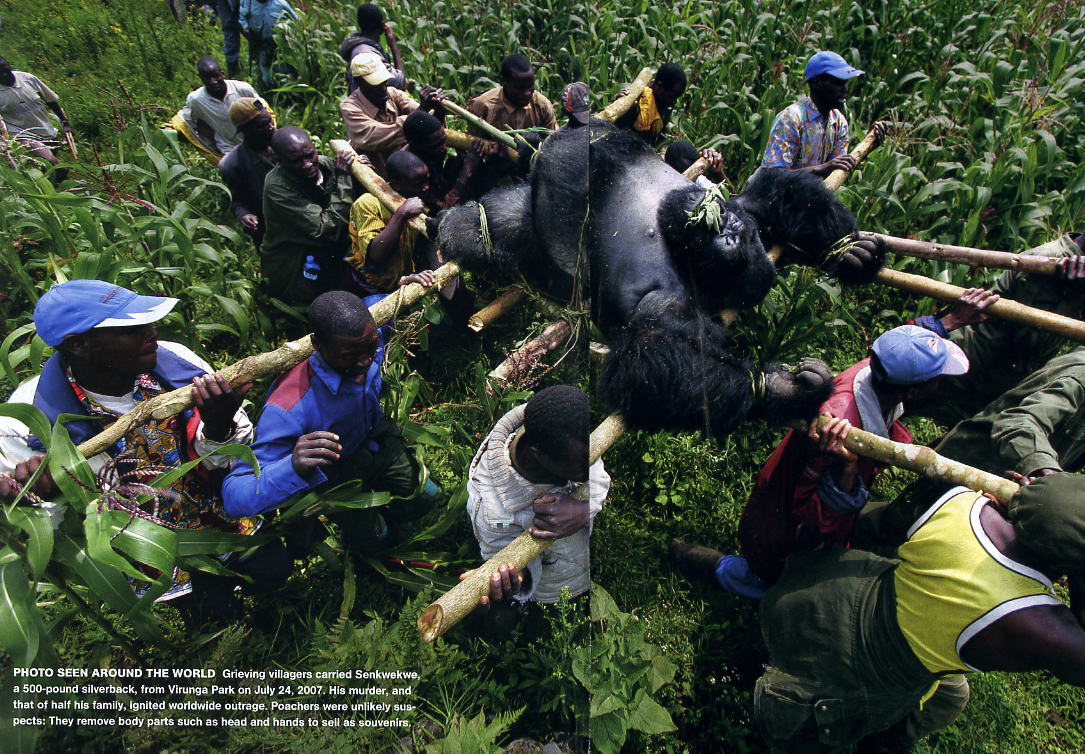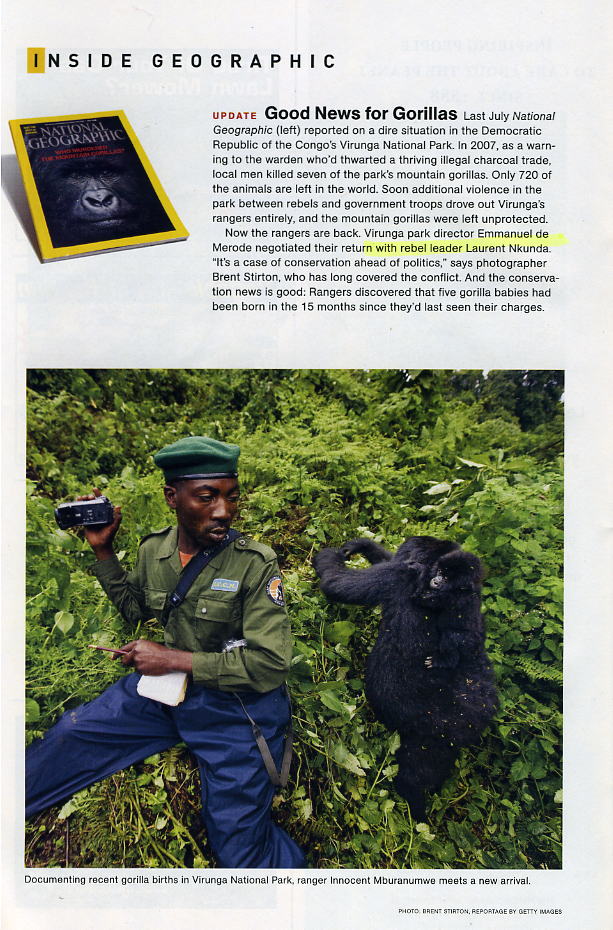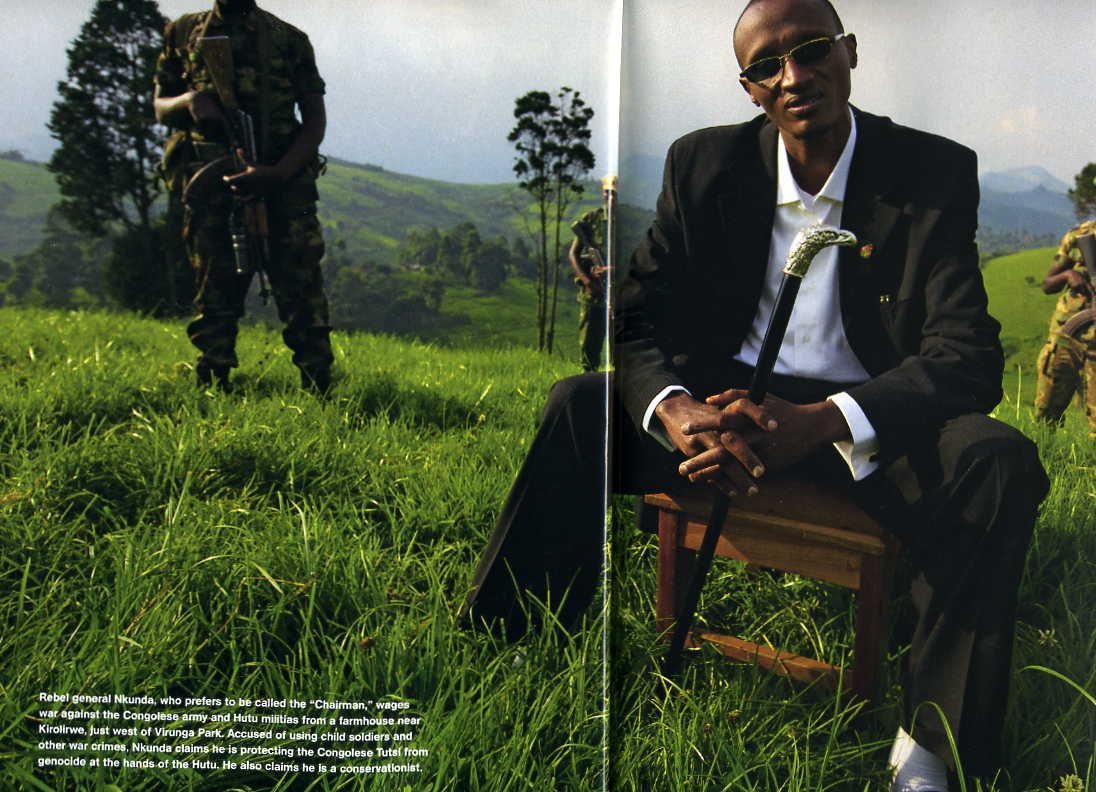Nkunda talked extensively about his plans to safeguard the gorillas
and develop Virunga National Park as a tourist destination.
"In other places they have petrol. We have the gorillas.
The park is like our petrol; the gorillas are our fuel.
These gorillas will remain and the national park will remain forever.
We have to protect them."
NKUNDA ARREST ENDANGERS GORILLAS

Congo Warlord's Arrest Puts Gorillas' Future in Turmoil
by Stefan Lovgren, National Geographic News, January 23, 2009
The political future of the Democratic Republic of the Congo's Virunga National Park — home to about 200 of the world's roughly 680 mountain gorillas — was thrown into turmoil Thursday night with the arrest of Congolese rebel leader Laurent Nkunda.
Nkunda's rebel movement had held sway over much of the region in which Virunga is located since August 2007.
When the rebels — called the National Congress for the People's Defense (CNDP) — took over the park, the government rangers working to protect the gorillas were forced to evacuate the area.
After a 15-month-long absence, the rangers were able to return in November 2008 after the park's director, Emmanuel de Merode, struck a deal directly with Nkunda to allow his rangers to resume their work.
It's unclear how that arrangement — and the protection of the gorillas — will be affected by Nkunda's arrest.
"We're being swept around by [political] events right now, but the national park has made a very concerted effort to remain apolitical," de Merode said Friday from the city of Goma, located outside Virunga. I'm reasonably confident that we'll be able to stay in the park."
Gorilla Protector?
Nkunda was arrested in neighboring Rwanda after he had fled a joint operation launched by the armies of Rwanda and Congo, according to the Associated Press. Rwandan and Congolese troops converged Thursday on Nkunda's stronghold in the Congolese town of Bunagana near the Ugandan border. But Nkunda fled farther south, crossing the border into Rwanda where he was taken into custody, an account confirmed by the Rwandan army.
In an interview last month with National Geographic News in Bunagana, Nkunda talked extensively about his plans to safeguard the gorillas and develop Virunga National Park as a tourist destination.
Likening Virunga and its crowd-pleasing apes to natural resources, Nkunda said, "In other places they have petrol. We have the gorillas. The park is like our petrol; the gorillas are our fuel.
"These gorillas will remain and the national park will remain forever. We have to protect them."
Reversal of Fortune
The arrest marks a startling reversal of fortune for Nkunda, who had been considered the key power broker in the long-running conflict in eastern Congo.
A former general in the Congolese army, Nkunda, who is an ethnic Tutsi, took up arms several years ago against Congo's government, claiming it wasn't doing enough to protect minority Tutsis from the Hutu militias who had fled to Congo in the wake of Rwanda's 1994 genocide.
Late last year fighting between Nkunda's rebels and Congolese forces displaced more than 250,000 people. But in recent weeks the rebel movement has suffered intense infighting. Nkunda has come under increasing criticism from his own deputies, some of whom accused him of being too authoritarian.
Nkunda was recently sidelined in a deal between the Rwandan and Congolese governments to jointly launch military operations to hunt down Hutu militia groups operating in Congo. This week about 4,000 Rwandan soldiers entered Congo as part of that campaign.
Congolese Information Minister Lambert Mende Omalanga told the BBC he welcomed Nkunda's arrest. "I think it is a good achievement for peace and security in this area and this region of Great Lakes," he said. Congo's government had issued an international warrant against Nkunda in 2005 for alleged war crimes and human rights abuses.
Shifting Territories
In recent days Congolese government troops and CNDP rebels have been seen together on the ground throughout the region. "There's been a very dramatic shift over the last 48 hours ... the Congolese government forces have established authority over [the area]," said de Merode, the Virunga park director.
Congolese government forces have been accused in the past of taking part in the illegal charcoal trade, which represents a major threat to the mountain gorillas and their habitat. Much of the charcoal is made from old-growth forest harvested inside Virunga National Park.
It is unclear exactly who is now in charge militarily in the Virunga region.
De Merode plans to travel Saturday to Rutshuru, a former rebel stronghold near the park, where he will meet with the traditional chief of the area. "The chief asked me to accompany him to reassure the populations in the central part of the park," de Merode said.
It's been only two months since the rangers returned to the park, and de Merode says it's critically important for them to be able to continue their work. "The thing about any national park is that it takes many years of hard work to build them up, to recover them, to reestablish them as healthy national parks, but it only takes a few days to destroy them," he said. "So we have to be there all the time to avoid that happening. At the moment our work is completely uninterrupted by these political events. But, he added, "the difficulties that we're facing are the same as the ones we'll be facing next week, next month, next year. We just have to keep going."
NKUNDA GEURRILLA GORILLA TOURS
Congo Warlord's Arrest Puts Gorillas' Future in Turmoil. National Geographic News, January 23, 2009
Congo's gorillas face uncertain future, Australia The Age, Jun 12, 2009
ROBERT Mulimbi approaches a hulking silverback gorilla with caution. He is more afraid for the gorilla than of it. Seven years ago, during one of the periodic lulls in the Democratic Republic of Congo's bloody war, when the violence that cost the lives of an estimated 5 million people had abated, he first saw the gorilla he calls Chimanuka. In Kahuzi-Biega National Park, a swath of tropical forest near the eastern border with Rwanda, the swirl of lawlessness and rampant poaching had pushed the world's last recorded eastern lowland gorillas to the brink of extinction. Or beyond it, the rangers thought. "We knew that the six families we had habituated to human contact had been killed and feared that all the gorillas had been wiped out," recalls Mulimbi, who has been a ranger for more than 25 years. "But then I found Chimanuka and we knew that some gorillas had survived." Now 24, Chimanuka seems blissfully unaware of his own significance. Weighing close to 200 kilograms and with a name that translates as "lucky find", he spends his days foraging for the next meal for his family of 17 females and 13 young. Around him, the situation seems settled. After a 2004 agreement ended major hostilities, park authorities were able to re-establish a toe-hold of control. With close monitoring, the recorded number of lowland gorillas has edged up to 117. For Chimanuka's family, the latest additions are two-month-old twins. But peace never really came to the Kahuzi-Biega park. And now the men with the guns are back. Chimanuka is again on the front line of eastern Congo's seemingly intractable, mineral-fuelled conflict. He is sandwiched between one of the region's most feared rebel groups [Hutu FDLR] and its most ill-disciplined national army [Kabila FARDC]. Despite the years of relative calm, the authorities still control only 10 per cent of the park. Hiding in the other 90 per cent are thousands of rebel fighters [Rwandan Hutu] from the Democratic Forces for the Liberation of Rwanda, or FDLR.... For the past few months, the main entrance to the Kahuzi-Biega park has been transformed into a Congolese Army base [Kabila FARDC]. Just kilometres away from where Chimanuka watches over his family, hundreds of troops are camped in mist and mud on the edge of the forest. Almost invariably poorly trained, underfed and heavily armed, they are part of a much larger forced that, with the support of 3500 UN troops [MONUC], is launching a major military offensive against the rebel army [Rwandan Hutu FDLR] and its illegally held mines in and around the park. But few are expecting success. In the neighbouring province to the north, a recent operation against the FDLR succeeded only in driving thousands more armed rebels south into the Kahuzi-Biega and sparking a wave of retribution killings against the local population. Already 100,000 people are displaced around the park, the UN says, and, with human rights groups describing the Congolese army [Kabila FARDC] as a hotchpotch of former rebels [FDLR/Pareco/Mai-Mai] more interested in pillaging than fighting, it is eastern Congo's population — and its gorillas — who look set to suffer. "The operation has created a psychosis of fear in the region," said Eric Kajemba, co-ordinator for local NGO, the Observatory of Governance and Peace. "No one is sure what will happen or how well the army will fight." Someone with first-hand experience of the FDLR's [Rwanda genocidal Hutus] fighting strength is Philippe Gombaniro. As one of the park's 88 rangers, he is paid as little as $US20 a month to venture into rebel-held [Rwandan Hutu] territory to try to count how many, if any, gorillas are left. Unsurprisingly, it is more than 25 years since the last full survey of gorillas in the park. In 1982, it was thought there might be up to 5000 but after decades of poaching and war, conservationists fear the worst. The rangers also face poachers looking to supply the local market for bushmeat and an increasing international demand for captive gorillas. For the park, and the world's remaining eastern lowland gorillas, stability, and the tourism that would follow, are the priority. "I keep on telling the people here that we have another mine of potential wealth for the region — the park, the gorillas and the tourism it could bring," says park director Radar Nishuli. But whether a military operation many think will lead to greater chaos and bloodshed is the answer, nobody yet knows.
Governments at UN-backed forum issue appeal to save gorillas. UN News, Jun 11, 2009
Delegates from 20 countries have signed a declaration asking governments across the world to help protect the gorilla, the United Nations Environment Programme (UNEP) said today. The agency said the gorilla should be saved not only for conservation reasons, but as potential money makers too. The 160 government officials, experts, corporate representatives and conservationists issued the declaration after a two-day meeting in Frankfurt marking the UN Year of the Gorilla. The declaration "appeals to governments, the international community and industrial companies to enhance activities to reduce threats to the remaining gorilla populations in the wild, which can contribute to peace-making and prosperity in Central Africa", UNEP said. Although gorillas are protected by law in every one of the ten African range States, they are hunted for their meat, which is sold at local markets and abroad, UNEP said. "Enforcement of wildlife laws is necessary to control the bush meat trade. One million tons of bush meat is harvested every year in the Congo Basin alone,” UNEP said. According the UN agency, gorillas and their habitats have the potential to support post-conflict reconstruction efforts and advance long-term regional economic development through ecotourism. A gorilla can generate indirectly $4 million during its life time. In Rwanda and Uganda tourism has developed into the leading contributor to the national economy exceeding the tea and coffee exports, UNEP said. Serapio Rekundo, Ugandan Minister for Tourism said: "The total revenue of Bwindi and Mgahinga National Parks increased by almost 80 per cent between 2005 and 2008. In addition to providing a boost to the national economy, gorilla tracking can even support wildlife conservation in other Protected Areas". The Year of the Gorilla is a joint initiative of UNEP-Convention on the Conservation of Migratory Species of Wild Animals (UNEP-CMS), the UNEP/UN Educational, Scientific and Cultural Organization’s Great Ape Survival Partnership (GRASP) and the World Association of Zoos and Aquariums (WAZA).
REMEMBERING MUTWARE THE ELEPHANT
 National Geographic Update, April 2009
National Geographic Update, April 2009
Last July National Geographic reported on a dire situation in the Democratic Republic of the Congo's Virunga National Park. In 2007, as a warning to the warden who'd thwarted a thriving illegal charcoal trade, local men killed seven of the park's mountain gorillas. Only 720 of the animals are left in the world. Soon additional violence in the park between rebels and government troops drove out Virunga's rangers entirely, and the mountain gorillas were left unprotected. Now the rangers are back. Virunga park director Emmanuel de Merode negotiated their return with rebel leader Laurent Nkunda. "It's a case of conservation ahead of politics," says photographer Brent Stirton, who has long covered the conflict. And the conservation news is good. Rangers discovered that five goirlla babies had been born in the 15 months since they'd last seen their charges.
COMPATRIOTS DEMAND NKUNDA RELEASE
FREE NKUNDA TO FIGHT FOR CONGO
Congo Warlord's Arrest Puts Gorillas' Future in Turmoil. National Geographic News, January 23, 2009
Nkunda didn't flee, he was lured ("for consultations" by erstwhile ally Rwanda). Independent, Jan 23, 2009
Congo war enters new phase without Nkunda (demanded Kabila cancel China contracts that are unfair to Congo people). Monsters & Critics, Jan 23, 3009
Rwanda joined Congo against Nkunda (after UN report & donors cut aid). NPR, Jan 23, 2009
Laurent Nkunda's spectacular fall (loyal & capable military leader protecting Congo from Rwandan Hutus). BBC, Jan 23, 2009
Rwanda arrests Congo rebel leader Nkunda (impediment to Rwanda's plans in region). BBC, Jan 23, 2009
Rwandan, Congolese troops heading for Nkunda stronghold. AFP, Jan 22, 2009
Kabila decides to embrace Rwanda. AFP, Jan 22, 2009
Nkunda demands Kabila cancel China contracts (benefits gov't officials not Congo citizens). VOA, Jan 8, 2009
NKUNDA GEURRILLA GORILLA TOURS

 Who murdered the virunga gorillas, National Geographic, July 2008
Who murdered the virunga gorillas, National Geographic, July 2008
 National Geographic, July 2008 (Rebel general Nkunda, who prefers to be called the "Chairman," wages war against the Congolese army and Hutu militias from a farmhouse near Kirolirwe, just west of Virunga Park. Accused of using child soldiers and other war crimes, Nkunda claims he is protectng the Congolese Tutsi from genocide at the hands of the Hutu. He also claims he is a conservationist....)
National Geographic, July 2008 (Rebel general Nkunda, who prefers to be called the "Chairman," wages war against the Congolese army and Hutu militias from a farmhouse near Kirolirwe, just west of Virunga Park. Accused of using child soldiers and other war crimes, Nkunda claims he is protectng the Congolese Tutsi from genocide at the hands of the Hutu. He also claims he is a conservationist....)
VISITING RWANDA'S RARE GORILLAS
Jackie Jura
~ an independent researcher monitoring local, national and international events ~
email: orwelltoday@gmail.com
HOME PAGE
website: www.orwelltoday.com